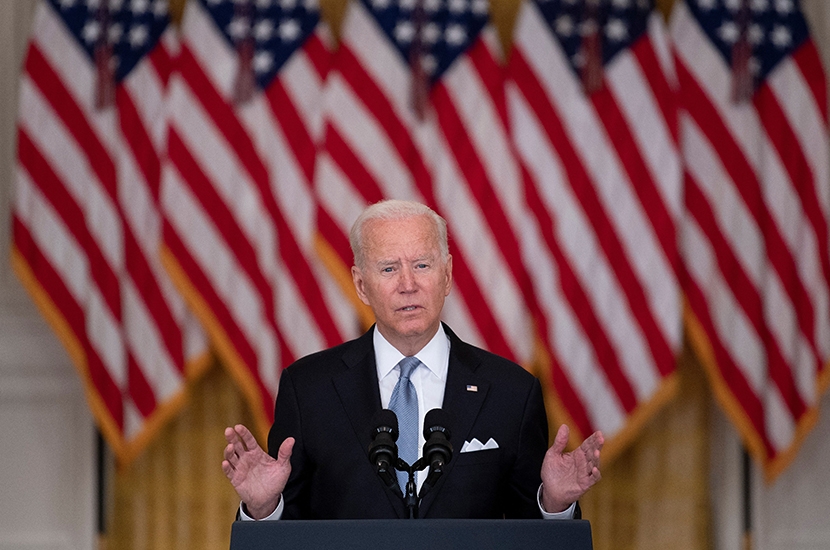One of the most interesting aspects of President Biden’s speech on the American withdrawal from Afghanistan is that it shows he suffers from faulty memory syndrome. Like many of the rest of us, I suspect.
Today Biden says that the mission of the allies in Afghanistan ‘was never supposed to have been nation-building’. But back in the early years of the conflict then Senator Biden was all for this now dirty phrase. ‘Our hope is that we will see a relatively stable government in Afghanistan,’ he said in 2001. One that ‘provides the foundation for future reconstruction of that country’. He was still holding to this line in 2003 when he said that the only alternative to nation building was ‘a chaos that churns out bloodthirsty warlords, drug traffickers and terrorists’.
Over the years that followed, the reasons for being in Afghanistan seductively changed. After the al-Qaeda justification, these other justifications all got bundled up into the same Afghan war package. Perhaps as part of an effort to keep liberals onside with the conflict, American and British officials at some point pivoted so that the main justification for still being in the country was to allow Afghan girls to go to school and the country’s women to live in relative safety. A justification noticeably hard to oppose.
Yet nine years after the invasion, Biden wasn’t keen on that justification either, just as he isn’t keen on the state-building one now. According to the accounts of America’s then special envoy to Afghanistan, Richard Holbrooke, Biden had lost patience with the women-and-girls defence long before the 2012 election. At a meeting with Holbrooke in 2010, the then vice-president reportedly erupted when the issue of US forces being in Afghanistan to defend women’s rights came up. ‘It just won’t work, it’s not what we’re there for,’ Biden reportedly said.
Today he claims America has stood up for and defended the Afghans who have co-operated with US troops and administrators. But in the same meeting with Holbrooke, Biden apparently exploded at the suggestion that America had an obligation to the Afghan people who had trusted them. ‘Fuck that. We don’t have to worry about that,’ said the man who is now president.
Perhaps Biden should be forgiven for forgetting what he believed 11 or 20 years ago, given that he has such trouble remembering what he said last month. During a press conference in July, he rather rudely chided the American media for asking difficult questions about the withdrawal of US troops from Afghanistan. All those days back, Biden insisted that a withdrawal would not precipitate the collapse of the Afghan government or army. He rejected any and all comparisons with America’s withdrawal from Vietnam. And he even went so far as to insist that there would be no footage of panicked helicopter airlifts off the roof of the US embassy in Kabul. In this, he was only repeating what his top generals had told him.
In June the toppiest of those top brass, Gen. Mark Milley, could be found testifying to Congress about so-called ‘white rage’. Perhaps the chairman of the Joint Chiefs of Staff was distracted by this newly invented syndrome. Certainly he had his eyes off Afghanistan, because last month he could be found assuring President Biden that ‘the Afghan security forces have the capacity to sufficiently fight and defend their country’.
I don’t say any of this particularly to lambast either Biden or Milley (though lambasting both is a thoroughly justifiable activity). I mention it because Biden’s own trajectory is not unique to him. I suspect that a great many of us have had faltering reasons to be for or against the Afghan war over the past two decades. Some of the contradictions that causes have rumbled on in recent days.
Many of the observers who have been most volubly lamenting America’s withdrawal are precisely those people who normally most object to the use of military force. Would the people lamenting the scenes at Kabul airport be happy with a re-invasion of Afghanistan? Would those now worrying most publicly about the situation of Afghan women join me in wondering whether the next time the Taliban post a photograph on social media of them in some Afghan government office, the people in charge of US drone command mightn’t regard this as a useful tip-off for their target selection?
I doubt it. And this gets to the heart of a major problem with what used to be called humanitarian interventionism. A flaw that it took me 10 years to recognize and helped make me slink away from encouraging any such projects in the future.
That problem is that the people most capable of making their peace with the use of force are the most suspicious about using force to spread human rights or state-build in far-off countries. While the people who are most in favor doing these things are the people most squeamish about the use of force. You can embark on, but not sustain, military projects whose main moral impetus comes from people who do not like the use of military force. Such missions are likely to fail, as we have seen.
There will be lots of talk in the coming days about the lessons we need to learn. But for now this is one of the few that I can identify. Thucydides showed us how truth in warfare is a highly elusive concept. From the Peloponnesian War to the first Algerian war, Vietnam and Iraq, that same fact has been borne out. We get glimpses of truth. We feel high for a moment on the certainty that what we are doing is right. But the truth and the certainty slip away, and as they do so, the people who supported it also slip away, or change their minds, or alter their record. Biden demonstrated that this week. But plenty of us will have demonstrated it too, in ways less public perhaps, but with an equally sneaking feeling of shame.
This article was originally published in The Spectator’s UK magazine. Subscribe to the World edition here.


















